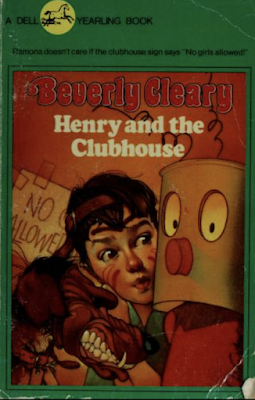In September he had been Second Indian in a play for the Westward Expansion Unit. That hadn't been too bad. He had stuck an old feather out of a duster in his hair and worn an auto robe his mother let him take to school. It was an easy part, because all he had to say was "Ugh!" First Indian and Third Indian also said "Ugh!" It really hadn't mattered which Indian said "Ugh!" Once all three said it at the same time.
▼
Friday, February 24, 2023
Stereotypes in Beverly Cleary's HENRY HUGGINS
A Native parent wrote to tell me that they were reading Henry Huggins aloud at home. They got to chapter four ("The Green Christmas) and read this:
They talked about the paragraph, including that reference to a "Westward Expansion" unit. They decided not to continue reading Henry Huggins. My guess is that many of you read it in your childhood and didn't notice the problems with that paragraph. If you were reading it aloud, today, would you pause when you got to that part?
****
Henry Huggins was first published in 1950, with illustrations by Louis Darling. I was able to locate a copy from that year. Here's a screen capture of that page:
The parent who wrote to me did not mention the illustration that shows Henry with the feathers and robe (note that he has a stern expression on his face for that part but when he's being a tooth he's smiling), so I think they were reading a newer edition, like this one from the 2007 edition:
There are no illustrations of Henry in his various roles in the 2007 edition. My guess is that someone decided they should not have an illustration of Henry as an Indian. But the passage? It is just as bad as the older illustration. No edits were made to the passage. I sure would love to see records of the conversation and decisions that took place! Read it without the paragraph. It would not impact the story at all if that paragraph were simply removed.
I also found a 2004 edition, in Spanish, that has the old illustration:
And, I wondered about other books in which Beverly Cleary may have included stereotypical content. I looked at book covers and noticed Henry--in face paint--on the 1979 Dell Yearling edition of Henry and the Clubhouse:
In chapter three, "Trick or Treat," we see that Henry has decided to be an Indian for Halloween:
On page 73, he goes to the living room to show his parents. His mother "pretended to be frightened at seeing an Indian and a wolf in the house."
Update:
I see that, in 2004, Neil Patrick Harris did the audio book edition of Henry Huggins. I listened to chapter four. He reads that paragraph aloud. What do voice actors do with passages like that? Do they have the opportunity to talk it over with anyone involved in the audio recording?
****
I wonder what might have happened if the child of the parent who wrote to me had been reading Henry Huggins in school? Would the teacher pause the read-aloud? Would they discuss it? If you or your child has had an experience like that with this book or any other one, please let us know.
1 comment:
----UNSIGNED COMMENTS WILL NOT BE APPROVED.----
In our efforts to have meaningful conversations with people who read AICL and to reduce trolling, we are no longer accepting unsigned comments.
Please include your name (not a pseudonym) and the nature of your interest (like parent, teacher, professor, reviewer, librarian, etc.). If you prefer to withhold identifying information because it may result in backlash to you in your workplace or elsewhere, please write to us directly.







I came across this article, after an internet search for advice or literature look on how to discuss and explain racism to a six year old. I had just read aloud Chapter 3 of Henry and the Clubhouse, at bedtime with my child and had to pause at this exact passage to have a discussion about how times have changed and how this kind of thing is extremely inappropriate and disrespectful. In the moment, I found it difficult to bring to a level that a six year old could understand, and was hoping to find literature on how to do a better job. We will continue to read Beverly Cleary books, as it has provided us with so many interesting and important opportunities for discussion of so many other things but I really hope this was the worst of it when it comes to the subject of racism.
ReplyDelete